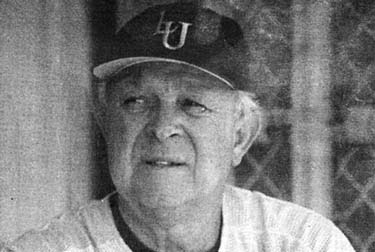Former head baseball coach Don Moreau, 66, filed a lawsuit Monday against Loyola for what he claims is age discrimination.
Ronald Wilson, Moreau’s attorney, said he sent a copy of the lawsuit to the Office of the President at Loyola Tuesday morning.
Moreau was fired on May 20, 2002, after the athletic department upgraded the baseball coach position to a full-time position, athletic director Jerry Hernandez said. Moreau worked as the part-time coach for 12 years.
Moreau was unavailable for comment because he is out of town coaching in a basketball tournament, Wilson said.
According to Hernandez, a full-time coach at Loyola must have a college degree. Since Moreau does not have one, the department decided to make a personnel change.
But Wilson said the real reason that Moreau was fired was because of his age. Moreau was 65 years old at the time he was fired; his replacement, Greg Mucerino, is 33.
Wilson also said that Loyola terribly mishandled the situation.
Shortly after leading his team to a Gulf Coast Athletic Conference championship and an appearance in the national tournament, Wilson said.
Moreau was given the choice of either resigning or being terminated.
Wilson said that the lawsuit could have been avoided had the university treated Moreau with more respect.
Moreau asked if he could consult his family before deciding but was denied permission. Wilson said his client begged to go home and talk to his wife, but that instead Moreau was terminated on the spot.
“What precipitated the lawsuit was the ultimatum of either resign or be terminated,” Wilson said. “He has felt humiliation from the way they treated him. If a person is treated with dignity, then most of these cases don’t happen.”
Hernandez claimed that he explained to Moreau that the department upgraded the baseball coach position to full-time, and that since Moreau didn’t meet the new requirements, he had to be let go.
“That’s it,” Hernandez said. “I told him very simply. Very plain.”
When Loyola reinstated athletics in 1991 after a 17-year period without sports, Moreau was hired as the baseball coach.
In his 12-year tenure, he led the team to seven GCAC appearances and finished with the all-time Loyola record for wins with 251.
Moreau is seeking compensatory and punitive damages, according to a press release issued Tuesday.
Wilson said that Moreau’s original contract was based on paying his salary over a 10-month period. But Moreau preferred to receive his salary over a 12-month period in order to be paid each month, Wilson said.
When Moreau was fired in May of 2002, his salary for June and July was never paid him, Wilson said. Moreau is suing for the two month salary plus the difference between his salary with his new job over the last year and Mucerino’s annual salary.
According to the press release, Moreau is also seeking damages for “anger, frustration, embarrassment, severe emotional distress, depression and anxiety,” that he allegedly experienced as a result of his firing.
According to public relations director Kristine David, Loyola plans to stand by its decision in firing Moreau. She said that she does not exactly know how the legal proceedings will play out.
Hernandez seconded that opinion. “It’s not (my) job to decide the case,” Hernandez said. “The courts through due process make the judgement.”
To sue Loyola for age discrimination, Moreau first had to get permission – called a Right to Sue letter – from the Equal Employment Opportunity Commission. He filed his suit with the EEOC on May 29, 2003, and was given the Right to Sue letter on August 29, 2003.
Wilson said that now Loyola has 20 days to answer the lawsuit and will probably file a motion for summary judgement. This is a request to the judge not to have a trial due to lack of issues in the case.
If the judge denies the motion for summary judgement, a federal trial with seven jurors would begin within the year, Wilson said. Wilson believes the case will go to trial and that his client has a good chance of being compensated.
“I think it’s a good case if you look at what coach Moreau did for the program,” he said. “He took it from nowhere to the conference championship. Then they terminate him and hire someone 30 years his junior.”








